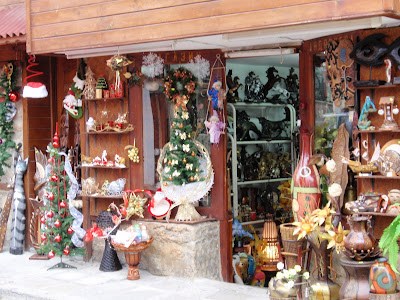Christmas in Bulgaria
For the last month, we’ve seen signs that Christmas is coming. The stores are decorated with Christmas trees, Christmas balls, snowmen and Santas. The merchandise has a definite Christmas theme – candles with Christmas trees, Christmas napkins, cakes, packaging. Lights flicker in the store windows and on the streets, and fir trees are decorated along the roads. There are more Christmas songs on the radio, but not as much as what I remember in the States – and in any case, they don’t really play much music in the malls.
I’ve talked to quite a few of my co-workers to learn about the different Christmas traditions that are celebrated here. Although there is probably a difference between the smaller towns and villages and the big cities, and between old customs from grandparents’ time, there seem to be a few things that seem to be the tradition in most homes.
For those that follow a more religious tradition, no meat is eaten for 40 days before Christmas. Even if most Bulgarians aren’t this strict, the traditional meal for Christmas Eve is a vegetarian meal, without even cheese or eggs. There are an odd number of dishes served (although I have also heard reports of 12 dishes, to represent the coming 12 months of the New Year). Some of the dishes include stuffed peppers and vine leaves, grains, nuts, fruit and the traditional pumpkin banitsa, which is a layered pastry made with phyllo dough. Fortunes are written and wrapped in foil and baked in the banitsa beforehand, and hopefully everyone will receive a good fortune for the coming year. Along this same line is a traditional round bread that is baked with a coin inside – the eldest male of the household gives out pieces of bread to everyone and whoever finds the coin is promised a year of good luck. Walnuts also are eaten for this same reason – everyone is supposed to crack open a walnut, and if the walnut inside is a good one, then it is a promise of a good year ahead. But, if someone has a bad nut, then he will not have a good year.
Christmas is a time for family to be together. In the past, the Christmas Eve dinner was eaten on the floor, where straw was spread, to remind them of the Nativity. Nobody is allowed to leave during the meal. It is also common not to clean up from the meal until the following day, since it was believed that the souls of dead family members come back to visit on this night.
Most people travel to be with their families for Christmas – most of the people I work with left yesterday, and will be gone through New Years. Along with my 2 Israeli bosses, I was the only one at work on Christmas Eve. The plus side – I had no trouble getting a taxi back and forth, and the streets were empty – what a pleasure!
We wish all of our Bulgarian friends a Vesela Koleda!
 Shop selling Christmas items in Nessebar.
Shop selling Christmas items in Nessebar.
 Nativity scene at a church in Nessebar.
Nativity scene at a church in Nessebar.
I’ve talked to quite a few of my co-workers to learn about the different Christmas traditions that are celebrated here. Although there is probably a difference between the smaller towns and villages and the big cities, and between old customs from grandparents’ time, there seem to be a few things that seem to be the tradition in most homes.
For those that follow a more religious tradition, no meat is eaten for 40 days before Christmas. Even if most Bulgarians aren’t this strict, the traditional meal for Christmas Eve is a vegetarian meal, without even cheese or eggs. There are an odd number of dishes served (although I have also heard reports of 12 dishes, to represent the coming 12 months of the New Year). Some of the dishes include stuffed peppers and vine leaves, grains, nuts, fruit and the traditional pumpkin banitsa, which is a layered pastry made with phyllo dough. Fortunes are written and wrapped in foil and baked in the banitsa beforehand, and hopefully everyone will receive a good fortune for the coming year. Along this same line is a traditional round bread that is baked with a coin inside – the eldest male of the household gives out pieces of bread to everyone and whoever finds the coin is promised a year of good luck. Walnuts also are eaten for this same reason – everyone is supposed to crack open a walnut, and if the walnut inside is a good one, then it is a promise of a good year ahead. But, if someone has a bad nut, then he will not have a good year.
Christmas is a time for family to be together. In the past, the Christmas Eve dinner was eaten on the floor, where straw was spread, to remind them of the Nativity. Nobody is allowed to leave during the meal. It is also common not to clean up from the meal until the following day, since it was believed that the souls of dead family members come back to visit on this night.
Most people travel to be with their families for Christmas – most of the people I work with left yesterday, and will be gone through New Years. Along with my 2 Israeli bosses, I was the only one at work on Christmas Eve. The plus side – I had no trouble getting a taxi back and forth, and the streets were empty – what a pleasure!
We wish all of our Bulgarian friends a Vesela Koleda!
 Shop selling Christmas items in Nessebar.
Shop selling Christmas items in Nessebar. Nativity scene at a church in Nessebar.
Nativity scene at a church in Nessebar.



Comments
Post a Comment